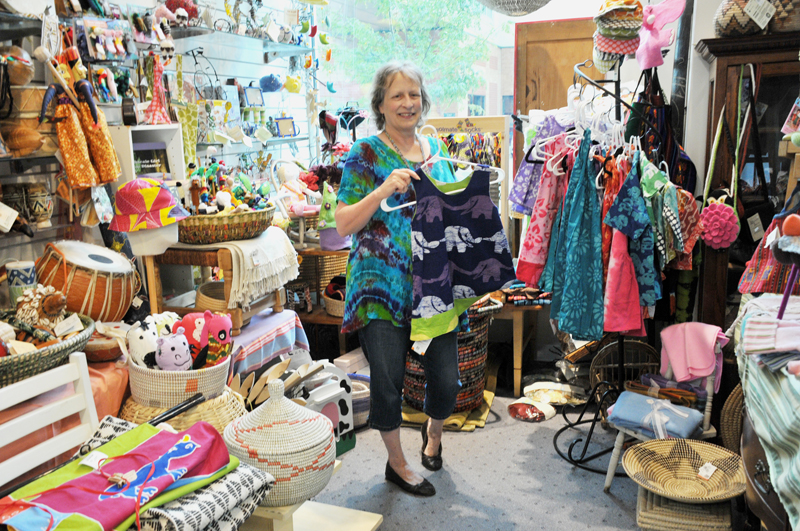By Lindsay Steele
The Catholic Messenger
While living in India, Becke Dawson witnessed the horrors of sweatshops firsthand.

Becke Dawson, owner of SIS International in Davenport, shows off some fair trade children’s clothing. Buying fair trade clothing is one way to support living wages and safe working environments for textile workers around the world.
She observed young teens and women working on the floor for upwards of 18 hours a day. “Home” was a wooden board not far from the factory, which served as a bed. After sleeping for a few hours, the workers would return to work to begin another long shift. She often saw children acting as “runners,” taking items from one place to the next.
It was heartbreaking enough to convince Dawson to try to make a difference. Once back in the United States, she began to sell fair trade items, which are made with the welfare of the worker in mind. She is the owner of SIS International in downtown Davenport.
Very few people know where their clothing comes from, she added, but those who do can make a difference by building awareness, advocating for fair wages and making different purchasing decisions.
One option is to purchase fair trade clothing, which is primarily available in fair trade stores and online retailers. Alicia Greenwood, a board member for the Ten Thousand Villages fair trade store in Iowa City, said it is harder to produce fair trade clothing than to produce jewelry and other handmade items. So many processes are involved in the production of apparel, from cotton-picking to thread-making to cloth production, to dying and sewing of garments. To be certified fair trade, close monitoring at each step must occur to make sure employees receive a living wage and are treated with respect. Therefore, clothing is a little harder to find than other fair trade items, she said.
Additionally, the fair trade clothing production process takes at least six months, meaning fair trade clothing groups and companies aren’t able to keep up with fashion trends as well as established, traditional clothing brands and manufacturers. So, the average buyer might not find fair trade offers as appealing.
SIS in Davenport carries girls’ and women’s clothing. Work of Our Hands fair trade store in Pella sells children’s sweaters and dresses and adult-sized ponchos. Some independent retail stores, such as The Ruby Slipper in Bettendorf, carry fair trade clothing items from time to time. Greenwood said online retailers — particularly Pact, Fair Indigo, Mata Traders, Marketplace Handworks of India and Global Mamas — are an option, as well. Patagonia is another brand that is trying to produce clothing more ethically; they have a store near Chicago and an online storefront.
While consumers might not be able to meet all their clothing needs through fair trade purchases, Greenwood suggested ethically-minded shoppers can send a message to clothing companies by purchasing fewer items and then buying fair trade accessories and scarves to maximize a smaller wardrobe.
Of non fair-trade merchandise, Dawson said tags “don’t tell the whole story.” Clothing changes hands an average of 11 times before it hits shelves, which means even U.S.-branded apparel may use fabric that was created or dyed overseas by poverty-wage workers. Still, she said U.S. apparel is still the best bet because it indicates that the garment manufacturer was subject to U.S. minimum wage requirements and worker safety laws.
College students, parents and sports fans have the option of purchasing Alta Gracia merchandise, which originates in the Dominican Republic and pays living wages to its employees. St. Ambrose University began carrying the brand’s sweatshirts and t-shirts about 18 months ago after students requested a fair-wage alternative to traditional sports brands, said manager Cory Sambdman.
Additionally, concerned consumers can speak out by supporting fair wage advocacy groups, such as the Human Thread Campaign and the Clean Clothes Campaign, and asking stores and brands to think about where their clothing comes from. Like the students at St. Ambrose, people can ask stores to carry fair trade and living wage items.
Loxi Hopkins, diocesan Social Action Office volunteer, recently called up the headquarters of her favorite brand to see where the clothing is manufactured and what kind of wages the workers receive. She hopes her actions will let the company know that people care about the workers who make their clothes. She said,
“We could all be more aware of where our clothes are made and under what conditions. …our bargains do come at a cost.”
Help put living-wage clothing in stores
The Human Thread Campaign, a Catholic organization which works for social justice in the textile industry, recently launched a campaign to encourage Macy’s and Kohls to offer fair trade brands in their stores. Consumers can download postcards addressed to the CEOs of these companies at www.humanthreadcampaign.org, print them and send them through the mail.












Reading all I can on here. Thanks.